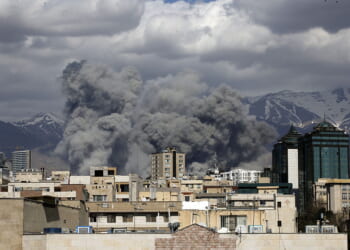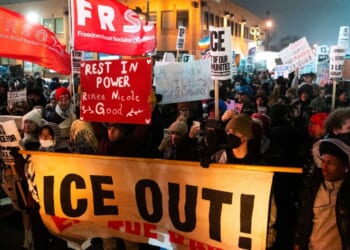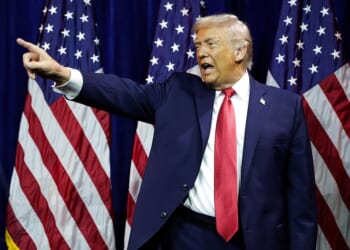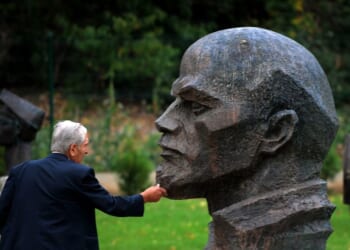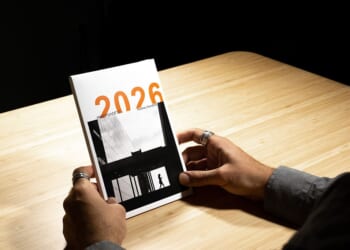You have seen the spectacle. The wild sideburns, the rousing speeches, the roaring chainsaw, the heavy metal music dominating his mass rallies. Javier Milei, the self-styled shackle-breaking, anarcho-capitalist madman, marketed himself as a radical departure from everything that came before. He was going to blow up Argentina’s corrupt political casta, abolish its central bank, adopt the dollar and every kind of crypto coin out there as Argentina’s competing currencies. It was a gutsy bid to replace a century of Peronist and neoliberal failure with the libertarian’s dream: a pure, unadulterated, free market.
Across the globe, the nationalist Right, from Elon Musk, Benjamin Netanyahu and Donald Trump to Giorgia Meloni and Britain’s Daily Telegraph, lionised him. Niall Ferguson, the financial oligarchy’s court historian, declared a “man-made miracle” in the making. For a few brief months, as Argentina’s inflation rate plunged from its peaks, and even the poverty rates seemed to decrease, the chorus of fanboys grew deafening. Until everyone fell silent.
Today, the miracle has been exposed as a mirage. Argentina’s economy has nose-dived and its peso is in a death spiral, with a desperate $20-billion lifeline from the US and yet more rescue loans from the IMF keeping the Milei show on the road until the forthcoming mid-term elections. Closer inspection of the poverty reduction sub-miracle also reveals a mirage: the only reason the relative poverty index dropped was that median incomes had fallen faster than those at the bottom with the result that that fewer people now count as poor. The situation in Argentina is what you would call a meltdown — but is it really a surprise?
Milei’s explanation is that he was undermined by the poisonous casta and its Leftist handmaidens. The alternative explanation of many of my Leftist comrades is that we are witnessing the inevitable failure that comes when libertarian ideology is put into practice. But I don’t buy either explanation. The truth is, I believe, far simpler, more sinister and depressingly familiar. Milei never really broke with Argentina’s sad oligarchic practices of the past. He merely rebranded a type of heist practised by a long succession of his predecessors — from Peronist Carlos Menem and anti-Peronist Fernando de la Rúa to hapless Adolfo Rodríguez Saá, whose presidency lasted a mere seven days, and, more recently, neoliberal Mauricio Macri who now supports Milei. While Milei used libertarian narratives successfully to distance himself from these people, his actual policies fail the most important libertarian litmus test.
Before you, dear reader, dismiss me as a Marxist (that I admittedly am) intent on dismissing a political opponent’s success as a dismal failure (something I avoid like a mortal sin), let me put it to you in simple, libertarian terms. If you (unlike me) truly believe in the markets’ superior wisdom, and want to rid Argentina of political constraints placed on the market mechanism, which market do you liberate first? The money market, surely. Which price distortion do you drive your chainsaw through first? The fixed (or bounded) exchange rate, unquestionably. And what is the last thing you do? Precisely what Milei did: borrow zillions of dollars, pile them up on top of an already unbearable heap of public debt, to prevent the money market from choosing freely the exchange rate of your currency.
Why did Milei do this? Why did he break his promise to neutralise, even abolish, his central bank and, instead, use it to prop the peso up to levels that the free market considered ruinously high? Milei’s answer is that, had he not defended the peso, the prices of imported goods would rise, thus undermining his fight against inflation. Maybe so. But that was the argument of previous Argentinian presidents whose legacy Milei’s chainsaw was meant to pulverise. A libertarian would never espouse that logic, which is in my view largely responsible for Argentina’s never-ending crisis.
In other words, if you truly believe that prices for medicines, bread, petrol and iPhones must be left to the ruthless but ultimately wiser forces of demand and supply, you must surely believe the same thing about the price or exchange rate of the peso. You would surely believe that pricier imports would help the peso to recover automatically and strengthen your prized disinflation process in an organic, rational manner.
As a libertarian, Milei should also know that propping up the peso is a fool’s wager. When your central bank’s dollar stash runs out, you need to do what no self-respecting libertarian does: enter into an unwinnable chicken game against merciless financiers who can always amass a war chest larger than any credit card the IMF or US Treasury Secretary Scott Bessent will provide you with. Bessent knows this better than anyone: as George Soros’s deputy, the pair of them broke the Bank of England playing exactly this type of game.
Unwilling to assume that Milei is a fool, the only remaining explanation is that he knew damn well what he was doing. Argentina is a highly unequal society combining mass poverty, a sophisticated polity, and an antiquated industrial sector alongside a rich, highly competitive export-oriented agricultural and mineral sector whose dollar proceeds allow first-world living standards to a small segment of society. Its oligarchic segment would love it if the peso were replaced, as it was in Ecuador, with the dollar, so that their domestic assets could be infinitely transferable to New York or Geneva. Otherwise, they demand a strong peso whenever they feel like liquidating a domestic asset and transferring its value abroad. Argentine Presidents have seldom failed to do this.
“Unwilling to assume that Milei is a fool, the only remaining explanation is that he knew damn well what he was doing.”
In 1991, Domingo Cavallo, President Menem’s Economy Minister introduced the so-called “Convertibility Plan”: pegging the peso to the dollar on a one-for-one exchange rate while borrowing enormous quantities of dollars to defend it. The artificially high peso value crushed exports, setting off a peso doom loop that led to a $40-billion IMF loan in 2000. Sound familiar?
During Menem’s presidency, Argentina’s ruling class knew that it was only a matter of time before those loans ran out and the peso crashed. So, they indulged in “carry trade”, borrowing pesos locally, converting them into dollars at the artificially high exchange rate, and wiring the dollars abroad. The longer the inevitable devaluation was delayed, courtesy of the burgeoning dollar debt, the more risks they took by buying domestic assets in pesos to liquidate a little later — hoping to benefit from the runaway domestic inflation before the crash came. Between 1998 and 2001, when the peso dropped like a stone, $70 billion was transferred out of Argentina by the very few, with a gigantic dollar burden of more than $100 billion falling on the impecunious multitudes and causing a humanitarian crisis.
More recently, something similar happened under President Mauricio Macri. After borrowing heavily from international markets to ingratiate himself with foreign creditors (who had bought Argentinian debt for pennies and demanded dollars) and maintain a façade of stability founded on an overvalued peso, Macri’s administration was forced to secure the largest standby loan in IMF history, $56 billion. It proved sufficient to bolster the peso’s value for long enough for institutional investors and the local oligarchy to complete the same ol’ heist: liquidate assets and transfer the dollars abroad.
As a result, Macri lost the 2019 election to Peronist Alberto Fernández whose government restructured its debt. While the peso’s value collapsed and inflation raged, the mechanisms remained the same: using external loans to facilitate an orderly exit for international capital at the potential expense of the domestic population did not end.
That’s when Milei entered the scene. Promising to drive his chainsaw through the corrupt practices supporting this type of heist, he did the opposite: he followed the heist script to the letter, but with a chainsaw as its new logo. His so-called libertarian revolution was, in reality, a highly disciplined operation to distort the markets in the service of a time-honoured oligarchic ruse. Raising new, unpayable dollar debts to effect a money market manipulation, he created yet another window for the wealthy and the well-connected to liquidate assets and move capital abroad at a favourable rate. The result will be to heap unfathomable costs, once the predictable collapse happens, on the shoulders of the weakest of Argentinians who had already been further weakened by Milei’s earlier austerian cuts.
But why this unprecedented, vicious austerity of Milei’s first months in office? If he was going to push public debt through the stratosphere to prop up a currency that would crash-land anyway, what was the point of his chainsaw slashing of government departments, the evisceration of social welfare, and the reduction of infrastructure spending to zero (the silliest form of austerity)? In his mind, creating a primary budget surplus at all costs would demonstrate to bond vigilantes and currency traders his fanatical determination to defeat inflation so that they would help him maintain the peso’s value just a little longer. It was, in short, a scorched-earth policy to buy time for the same heist (bolster-liquidate-transfer) that has made Argentina fail again.
On a personal note, if I may, I am the last politician who has the right to judge another for sporting a leather jacket and appearing, almost out of nowhere, with an agenda of radical change aimed at ending a doom loop of unpayable debts caused by an unsustainable currency. But I would be remiss if I did not draw the reader’s attention to the real parallel: that of Milei to my prime minister at the time, in 2015, who, though never seen in a leather jacket, also used a radical (albeit Left-wing) language to inspire a population before ending up serving the local oligarchy perfectly well through the adoption of the sad ol’ policies of his predecessors.
Like in the case of my former prime minister, whose true legacy was a betrayal of the Left’s values, Milei’s true legacy is not freedom, but a country stripped even more bare than before. He had an opportunity to try a libertarian “single shot” experiment but he, instead, used it up to facilitate yet another fire sale of Argentinian assets. Had he stuck to his libertarian guns, we would have at least had the pleasure of observing a natural experiment by which to judge whether libertarianism (contrary to what I believe) can deliver any goods at all. Milei’s subservience to the Argentinian ruling class denied us even this small mercy.
And so, the global search for authentic alternatives to the depressing recapitulation of oligarchic practices continues.






